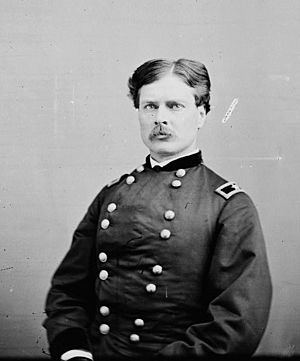George Alexander Forsyth facts for kids
Quick facts for kids
George Alexander Forsyth
|
|
|---|---|

Brevet Brig. Gen. George A. Forsyth
|
|
| Nickname(s) | Sandy |
| Born | November 7, 1837 Muncy, Pennsylvania |
| Died | September 12, 1915 (aged 77) Rockport, Massachusetts |
| Place of burial | |
| Allegiance | United States of America Union |
| Service/ |
U.S. Regular Army; Union Army |
| Years of service | 1861–1890 |
| Rank | |
| Unit | 8th Illinois Cavalry 9th U.S. Cavalry 4th U.S. Cavalry |
| Battles/wars | American Civil War American Indian Wars |
George Alexander Forsyth (November 7, 1837 – September 12, 1915) was an important United States Army officer. He was well-known for his brave service in the cavalry, especially during the American Civil War and the American Indian Wars. He was often called "Sandy" by his friends.
Contents
Early Life and Beginnings
George Alexander Forsyth was born in Muncy, Pennsylvania. He went to school at Canandaigua Academy. Before the Civil War started, he moved to Illinois.
Service in the Civil War
When the American Civil War began, Forsyth joined the army on April 19, 1861. He started as a private in a volunteer cavalry unit. This unit was called Barker's Company, Chicago Volunteer Dragoons.
He quickly earned promotions. On September 18, 1861, he became a first lieutenant in the 8th Illinois Cavalry. He was promoted to captain in February 1862. By September 1863, he became a major.
Forsyth fought in many major battles with the Army of the Potomac. He also took part in several cavalry fights in the Shenandoah Valley. During this time, he worked as an aide-de-camp for Major General Philip Sheridan. An aide-de-camp is like a personal assistant to a high-ranking officer.
For his bravery at the Third Battle of Winchester and the Battle of Cedar Creek, he received a special promotion. This was a brevet promotion to colonel on October 19, 1864. A brevet rank is an honorary promotion for good service. It does not always come with higher pay.
At the end of the war, on March 13, 1865, he was given another brevet promotion. He became a brevet brigadier general of volunteers. This was a common way to honor many officers for their service.
After the Civil War
After the Civil War ended, Forsyth continued his military career. He joined the regular army as a major in the 9th U.S. Cavalry on July 28, 1866. He received more brevet promotions for his Civil War actions. He was promoted to lieutenant colonel for his bravery at the Battle of Dinwiddie Court House. He also became a brevet colonel for his service at the Battle of Five Forks.
Battle of Beecher Island
In 1868, Forsyth led a group of fifty skilled frontiersmen. These men served as scouts in Indian Territory. This group fought bravely at the Battle of Beecher Island. They faced a group led by a warrior named Roman Nose. Forsyth's group won this important battle. For his leadership, he received another brevet promotion to brigadier general on September 18, 1868.
Later Career and Retirement
From 1869 to 1873, Forsyth worked as a military secretary for Lieutenant General Sheridan. He also served as Sheridan's aide-de-camp again from 1878 to 1881. On June 26, 1881, he was promoted to lieutenant colonel in the 4th U.S. Cavalry.
George Alexander Forsyth retired from the Army in March 1890. In April 1904, he was promoted to colonel on the Retired List. He passed away in Rockport, Massachusetts, and was buried at Arlington National Cemetery. He also wrote a book in 1900 called Thrilling Days in Army Life.
Images for kids
 | George Robert Carruthers |
 | Patricia Bath |
 | Jan Ernst Matzeliger |
 | Alexander Miles |


